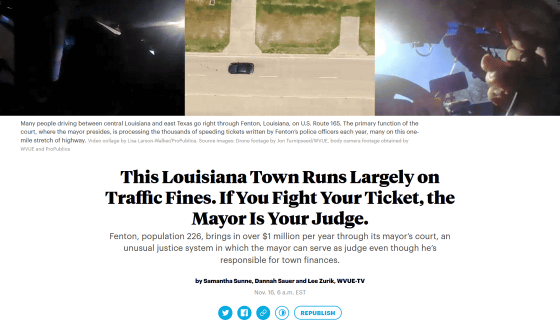What is a special trial held in a village of only 226 people who crack down on traffic violations and make about 90% of their revenue from fines?

Traffic fines generate revenue for local governments, but the amount is generally small compared to the local government's overall revenue. However, in the village of
This Louisiana Village Brought in $1 Million Through a Court Where the Mayor Is the Judge — ProPublica
https://www.propublica.org/article/fenton-louisiana-brought-in-1-million-through-mayors-court

Located on the outskirts of Lake Charles , an important center for the petrochemical industry, Fenton is a very small municipality with a population of approximately 226 people. The village consists of about 20 blocks, and the only notable buildings are the town hall, library, gas station, small public housing complex, chain general store, grain storage facility, and church.
The road from central Louisiana to east Texas runs through the north side of Fenton, and many cars pass through Fenton, although it only takes about a minute to pass through. Just before the entrance to the village, the road switches from the National Route 165 expressway to a regular road, and the speed limit is lowered from 65 mph (approximately 105 km) to 50 mph (approximately 80 km). Fenton police officers are said to be on the road handing out a large number of traffic tickets to drivers who fail to notice speed changes or do not slow down sufficiently.
As a result, Fenton has earned $1.3 million (approximately 194 million yen) mainly from traffic violation fines and forfeitures in about one year until June 2022. This amount is more than most municipalities in Louisiana, and is about the same as Shreveport, Louisiana's third largest city, with a population of about 187,000.
In Fenton, fines and forfeitures account for 92.5% of revenue, compared to 1.7% for the average American municipality. In other words, in Fenton, which has a small population and can hardly collect sales or property taxes, almost all the funds necessary for village operations are covered by traffic violation fines.

In addition, Fenton has a special court called the 'Chief Court' that can be seen in small municipalities such as Louisiana and Ohio. Chief Justice is a system in which minor crimes such as traffic violations are handled by a ``court presided over by the head of the local government,'' and as of the time of writing, it is functioning in approximately 250 small local governments. .
Chief courts, like district courts, handle violations of local ordinances, but in Louisiana they operate in a gray area of the law. District court judges are required to have a law degree and pass the bar exam, while chief justices can serve as presiding judges in chief justice courts without meeting these requirements. As the presiding judge, the chief can impose fines on violators or sentence them to imprisonment.
Naturally, chief courts must ensure that defendants receive a fair trial, but unlike other courts, chief courts have laws such as the Criminal Procedure Act that ensure that chief courts operate fairly and appropriately. It is not subject to regulation. Eric Foley, a lawyer with the MacArthur Justice Center, a law firm specializing in civil rights, says, ``Chief courts operate in the shadow of the law.''

While the roads that pass through Fenton are certainly ripe for speeding, the small village collects as many fines as large cities each year, making it an important source of income for the village. There are also voices that suspect that arbitrary crackdowns are being carried out. It has also been pointed out that there is a conflict of interest because the trial to decide whether to impose a fine on a violator is held in the Chief Justice's Court, where the village chief of Fenton presides over.
In 1972, a person who had been issued a traffic ticket told the Chief Justice Court in
The case went to the U.S. Supreme Court, which ruled that Monroeville Chief Justice did not provide a fair trial. Judge William Brennan Jr. said the issue was whether the mayor could be considered an impartial judge.He presided over trials and also managed municipal finances, and the courts accounted for most of the revenue. We concluded that a fair trial cannot be held if the defendant is occupied.
Later, in Louisiana, a ruling was made that the chief may have bias in court if ``more than 10% of the revenue comes from the chief's court.'' The Louisiana Judicial College addresses this conflict of interest issue in a training video on chief courts , recommending that if the chief court accounts for more than 10% of a municipality's revenue, the presiding judge should be appointed an attorney. However, in Fenton, Eddie Alfred Jr., who has been the village chief since 2009, is still the presiding judge.
'The mayor, who is trying to raise money for the municipality, is the one responsible for prosecuting these minor crimes and making sure the city pays the fines,' said Joel Friedman, law professor emeritus at Tulane University in Louisiana. They have no accountability and can do whatever they want.'

Related Posts:
in Note, Posted by log1h_ik







